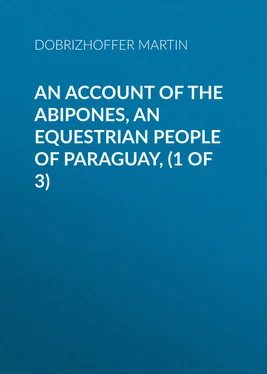Martin Dobrizhoffer - An Account of the Abipones, an Equestrian People of Paraguay, (1 of 3)
Здесь есть возможность читать онлайн «Martin Dobrizhoffer - An Account of the Abipones, an Equestrian People of Paraguay, (1 of 3)» — ознакомительный отрывок электронной книги совершенно бесплатно, а после прочтения отрывка купить полную версию. В некоторых случаях можно слушать аудио, скачать через торрент в формате fb2 и присутствует краткое содержание. Жанр: foreign_antique, foreign_prose, на английском языке. Описание произведения, (предисловие) а так же отзывы посетителей доступны на портале библиотеки ЛибКат.
- Название:An Account of the Abipones, an Equestrian People of Paraguay, (1 of 3)
- Автор:
- Жанр:
- Год:неизвестен
- ISBN:нет данных
- Рейтинг книги:3 / 5. Голосов: 1
-
Избранное:Добавить в избранное
- Отзывы:
-
Ваша оценка:
- 60
- 1
- 2
- 3
- 4
- 5
An Account of the Abipones, an Equestrian People of Paraguay, (1 of 3): краткое содержание, описание и аннотация
Предлагаем к чтению аннотацию, описание, краткое содержание или предисловие (зависит от того, что написал сам автор книги «An Account of the Abipones, an Equestrian People of Paraguay, (1 of 3)»). Если вы не нашли необходимую информацию о книге — напишите в комментариях, мы постараемся отыскать её.
An Account of the Abipones, an Equestrian People of Paraguay, (1 of 3) — читать онлайн ознакомительный отрывок
Ниже представлен текст книги, разбитый по страницам. Система сохранения места последней прочитанной страницы, позволяет с удобством читать онлайн бесплатно книгу «An Account of the Abipones, an Equestrian People of Paraguay, (1 of 3)», без необходимости каждый раз заново искать на чём Вы остановились. Поставьте закладку, и сможете в любой момент перейти на страницу, на которой закончили чтение.
Интервал:
Закладка:
Away went the messengers like the wind. The old cacique and I pursued their footsteps at a slower pace, beguiling the inclemency of the weather and the asperities of the journey by familiar conversation; and whilst the majority of Europeans were feasting luxuriously, (for it was the third day of the carnival,) we , sitting on the margin of a river, restored our exhausted strength by a draught of cold water. About sun-set, the vast hut I described appeared in view. A crowd of the natives, fitted out with bows and arrows, and crowned with parrots' feathers, attended our arrival and addressed us with the usual salutation Ereyupa , Now thou art come: to which I returned the accustomed Ayù anga , Now I am come. One of them approached me, and, as if angry with himself for having forgotten his crown, ran back for it, and returned with it on to greet me. As I was standing with some of my companions at the door of the house, there arose a mighty trepidation amongst the women and children. "There is nothing at all to be afraid of, dear sisters," said the eldest of my Indians. "You see before you your relations, the descendants of your ancestors. Not one of us harbours an evil thought towards you. I am the chief and director of them all." "What the old man has told you," said I, "is perfectly true. No one present is evilly disposed towards you but myself. I am a terrible fellow; for" (putting on a fierce countenance and uttering a hiss) "at one mouthful I intend to devour two or three children." This pleasantry changed all their terror into laughter. The women returned to their stations, and with one accord entreated me to enter the house. "You will never persuade me to that," replied I. "I see you have dogs and whelps amongst you, and where dogs are there must fleas be also: now there is nothing I dread so much as fleas, because they are disturbers of sleep, which, after the fatigues of a long journey, I feel myself sorely in want of. But I will not go far from your residence. In this open spot, where I may see and be seen by all, I am resolved to station myself." And truly, for the sake both of decorum and security, I spent three days and nights in the open air, though the weather was occasionally rainy.
The same evening I hinted to the Cacique Roy, that I wished to see all the inhabitants of the place assembled in one spot, that I might address them, and present them with suitable gifts. My wishes were immediately gratified. They sat around me in such modesty and silence that I seemed to behold statues instead of men. To awaken their attention I played for some time on the viol d'amour. Now, though I think myself the very worst of musicians, yet in these woods I was pronounced an Orpheus by my auditors, who had never heard a better or a worse performer than myself, or indeed any other music whatever, except that which they produce with rattling gourds together. I then addressed the assembly to the following effect: "I do not repent the long journey I have taken, the rivers and marshes I have crossed, the troubles which I have undergone, now that I see you well and kindly disposed towards me. My errand is to render you happy; your friend I am in all sincerity. Suffer me then to declare candidly what I feel with respect to you. I lament and pity your lot, which has buried you amid the shades of woods, ignorant alike of the beauties of the world and of God their creator. I know you pronounce the name of God; but how he must be worshipped, what he forbids, what he ordains, what he promises to the good, and what threatens to the evil, that ye know not: nor, unless taught by a priest, can ye ever learn it, miserable while ye live, and most miserable hereafter when ye die." Here I briefly explained the principal heads of religion with what plainness I could. As I discussed these things, they all listened very attentively, except that the boys laughed a little when I made mention of hell fire. The old man also, when he heard from me that marriage with relations was forbidden, exclaimed, "Thou sayest well, father; such marriages are abominable, but this we know already." From which I discovered that incestuous connexions seemed more execrable to these savages than murder or robbery. Just as I was about to finish my speech, I eyed the congregation more attentively, and cried out, like one astounded, "Alas! in all this numerous assembly I see very, very few of an advanced age; but the reason is manifest. The daily miseries which surround you ruin your constitutions, and bring on a premature death. With naked limbs you daily suffer the injuries of the weather. Your roofs, pervious to every wind, how little do they defend you! Whole days you traverse the woods like famished wild beasts, the chase at last often fruitless, your subsistence fortuitous, what wonder then if continual solicitude about your maintenance harasses your minds? Not to mention the constant risk to which your lives are exposed from the claws of tigers, the bites of serpents, and the weapons and teeth of enemies. Nay, setting aside these things, a soil always damp, as I find yours to be, swarming with gnats and other insects, must unquestionably prove the nursery of diseases. And what hope can the invalid entertain of recovering his health in this your solitude, far from medicine or medical advice? For those whom you call physicians are impostors, fitter for cheating than curing you. From such inconveniences and perils, the Indians your brothers are almost free, who, assembled in one town, conform their lives to the commandments of God and the regulations of the priests. How many old men might you meet with there! Nor need you wonder that the majority extend their lives to the extremity of age, when such and so many assistances are supplied them in the city, of the highest efficacy in prolonging life. In the town separate dwellings are marked out for each, not indeed always the most splendid, but fortified against the vicissitudes of the weather. A suitable portion of beef is every day awarded gratuitously to each. With corn, fruit and vegetables they are commonly well enough supplied from their own land. Every year new clothes are distributed to each. Knives, axes, glass-beads, and similar ornaments, are given as presents. Skilful physicians are night and day in attendance on the sick, who carefully provide them with food prepared in the father's dwelling, and with fit medicine, as occasion requires. If any of you think I have made a greater boast of these things than truth warrants, see before you stand Indian Christians, your brothers, and my companions and clients, of whom the greater part were born and brought up in woods like yourselves, and now, for many years back, have lived under my authority in St. Joachim. Cast your eyes on their garments. Enquire from them the mode of life which exists amongst us. You will quickly learn that they are contented with their lot, and think themselves most happy in every point of view. They have been what you are now; and you have it in your power to be what they now are. Do not deny yourselves this felicity. Consider whether it be expedient to immure yourselves in dusky woods, the prey of successive calamities, and final death. It rests with you to act conformably to my good instructions. With open arms we will receive you as friends receive friends, and without delay make you our fellow townsmen. To propose this to you, and persuade you to accept it, I have taken a long and, as you know yourselves, a most difficult journey, urged by my love and yearning towards you; – but no more need be said on this subject."
To add weight to my oration, I presented each of my auditors with trifling gifts, – little knives, scissors, hooks, axes, mirrors, rings, ear-rings, and necklaces of glass-beads. I seemed to have borne down all before me, because I had mingled my oration with a copious largess. For it passes belief with what significations of joy and good-will towards me, on the breaking up of the assembly, each retired to his quarters. In a little while, Cacique Roy, to testify his gratitude, offered me some loaves, prepared, he said, on my account, by his old wife. These loaves were round, made of maize, thin, baked under the hot ashes, which they resembled in colour, and, in a word, so disagreeable that their very sight would disgust the most hungry European. Nevertheless, to temporize as much as might be, I praised the skill of the baker, and their great disposition to gratify me; and taking them in one hand, returned them pleasantly with the other, adding, that it would please me highly if his children would feast on these dainties to celebrate my arrival. The old man approved my counsel, and took back the loaves with the same joy as he had brought them. Strangers must indeed be cautious how they receive food offered by savages, who are very skilful in mixing it with poison, and though officious, always to be feared, as regarding other tribes with an hostile eye. Cacique Roy had a little house for himself and family separate from the rest; yet during the three days we spent with them, he passed the night in that vast dwelling I have named, whether anxious for the safety of his own subjects or of us, I know not. We spent our nights in the open air in the middle of the dwellings of the savages. I cautioned my men to sleep and watch by turns, lest we should be surprised in our sleep by the designs of many. But there was not a symptom or occasion of fear on either side, though the suspicion of danger never left us. On the following day, I sent four chosen men of my associates, with Arapotiyu, to slaughter an ox, which I had left at a distance, and bring its flesh to make a feast for the savages. Nothing could have been devised better calculated to raise their spirits; for the Americans never rejoice with more heartfelt glee, nor pay a more prompt obedience, than when their stomachs are full of beef. The Cacique had a pleasure in spending many hours of the day in familiar conversation with me. He told me ingenuously, that both he and his distrusted the Spaniards and Portugueze in every thing. To conciliate therefore his confidence and good-will towards me, I declared that I was neither a Spaniard nor a Portugueze. Which circumstance being strongly urged by me, the Cacique told all his hordesmen that I was neither of Spanish nor Portugueze extraction, which had the utmost effect in tightening the new chain of friendship and good-will towards me which bound their savage minds. I must here relate a circumstance which I cannot write without a blush, nor can it, I think, be read without a smile. As the Cacique was smoking tobacco through a reed, he opened at once his intentions and his ignorance to my Indians who were sitting with him. "I have conceived an affection," says he, "for our father, seeing for certain that he is not a Spaniard, and should like to enjoy his company as long as I live. Now I have a daughter, the prettiest girl in the world, and I am resolved to marry her to the father, that he may always stay in our family. This intention I have just broke to my wife, and she is of the same mind as myself." On hearing this foolish speech of the old man's, my Indians could not refrain from laughing; and being asked the cause, replied, "that the fathers always live celibate, and are interdicted from marriage by the most sacred law." The old man was thunderstruck; " An eyrae! " he exclaimed, with his tobacco reed suspended in the air, "what strange thing is this you tell me?" His astonishment was mingled with sighs, for he grieved that he could not accomplish his wishes. This ridiculous conversation I overheard walking behind among the trees, but dissembling my knowledge, asked my Indians, what the sudden laugh meant; but they were ashamed to repeat to me the Cacique's absurd proposal, and blushing held their peace. It is observable amongst the Guarany Indians, that if many are asked at once, no one answers. I therefore asked one of them separately, who related to me the whole conversation. I thanked the Cacique for his kind intentions towards me, and told him that I and all priests professed that kind of life which excludes wedlock altogether; but that though I could not be his son-in-law, he should always find me his most sincere friend, and, if he wished it, his companion and instructor in Christianity. When he had heard this he redoubled his astonishment and his declarations of affection.
Читать дальшеИнтервал:
Закладка:
Похожие книги на «An Account of the Abipones, an Equestrian People of Paraguay, (1 of 3)»
Представляем Вашему вниманию похожие книги на «An Account of the Abipones, an Equestrian People of Paraguay, (1 of 3)» списком для выбора. Мы отобрали схожую по названию и смыслу литературу в надежде предоставить читателям больше вариантов отыскать новые, интересные, ещё непрочитанные произведения.
Обсуждение, отзывы о книге «An Account of the Abipones, an Equestrian People of Paraguay, (1 of 3)» и просто собственные мнения читателей. Оставьте ваши комментарии, напишите, что Вы думаете о произведении, его смысле или главных героях. Укажите что конкретно понравилось, а что нет, и почему Вы так считаете.












